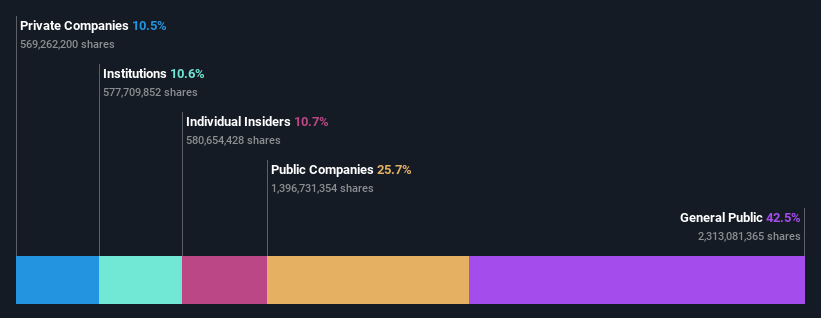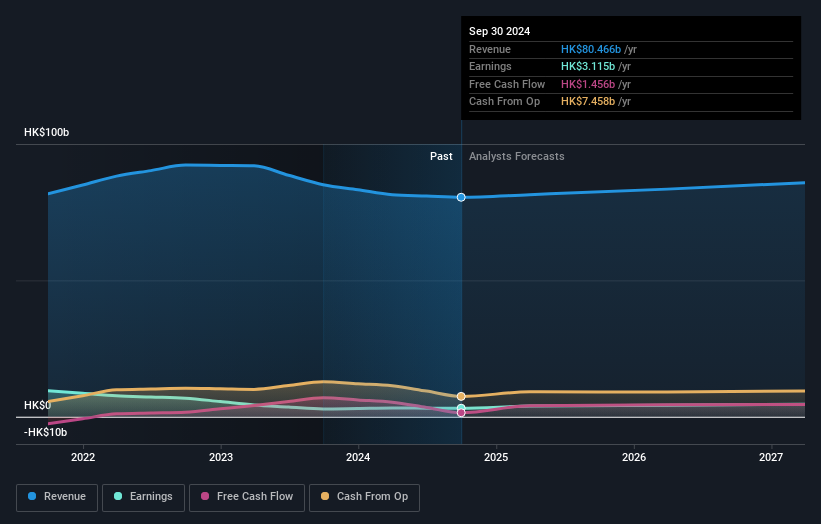- Hong Kong
- /
- Gas Utilities
- /
- SEHK:384
China Gas Holdings Limited's (HKG:384) top owners are individual investors with 43% stake, while 26% is held by public companies

Key Insights
- China Gas Holdings' significant individual investors ownership suggests that the key decisions are influenced by shareholders from the larger public
- 51% of the business is held by the top 6 shareholders
- Recent sales by insiders
If you want to know who really controls China Gas Holdings Limited (HKG:384), then you'll have to look at the makeup of its share registry. And the group that holds the biggest piece of the pie are individual investors with 43% ownership. That is, the group stands to benefit the most if the stock rises (or lose the most if there is a downturn).
And public companies on the other hand have a 26% ownership in the company.
In the chart below, we zoom in on the different ownership groups of China Gas Holdings.
See our latest analysis for China Gas Holdings

What Does The Institutional Ownership Tell Us About China Gas Holdings?
Many institutions measure their performance against an index that approximates the local market. So they usually pay more attention to companies that are included in major indices.
As you can see, institutional investors have a fair amount of stake in China Gas Holdings. This implies the analysts working for those institutions have looked at the stock and they like it. But just like anyone else, they could be wrong. If multiple institutions change their view on a stock at the same time, you could see the share price drop fast. It's therefore worth looking at China Gas Holdings' earnings history below. Of course, the future is what really matters.

China Gas Holdings is not owned by hedge funds. Beijing Enterprises Holdings Limited is currently the company's largest shareholder with 26% of shares outstanding. With 10% and 7.4% of the shares outstanding respectively, First Level Holdings Ltd and Ming Hui Liu are the second and third largest shareholders. Ming Hui Liu, who is the third-largest shareholder, also happens to hold the title of Chairman of the Board.
We did some more digging and found that 6 of the top shareholders account for roughly 51% of the register, implying that along with larger shareholders, there are a few smaller shareholders, thereby balancing out each others interests somewhat.
Researching institutional ownership is a good way to gauge and filter a stock's expected performance. The same can be achieved by studying analyst sentiments. Quite a few analysts cover the stock, so you could look into forecast growth quite easily.
Insider Ownership Of China Gas Holdings
The definition of an insider can differ slightly between different countries, but members of the board of directors always count. The company management answer to the board and the latter should represent the interests of shareholders. Notably, sometimes top-level managers are on the board themselves.
Insider ownership is positive when it signals leadership are thinking like the true owners of the company. However, high insider ownership can also give immense power to a small group within the company. This can be negative in some circumstances.
It seems insiders own a significant proportion of China Gas Holdings Limited. It is very interesting to see that insiders have a meaningful HK$3.7b stake in this HK$35b business. Most would say this shows a good degree of alignment with shareholders, especially in a company of this size. You can click here to see if those insiders have been buying or selling.
General Public Ownership
The general public, who are usually individual investors, hold a 43% stake in China Gas Holdings. While this size of ownership may not be enough to sway a policy decision in their favour, they can still make a collective impact on company policies.
Private Company Ownership
It seems that Private Companies own 10%, of the China Gas Holdings stock. It's hard to draw any conclusions from this fact alone, so its worth looking into who owns those private companies. Sometimes insiders or other related parties have an interest in shares in a public company through a separate private company.
Public Company Ownership
Public companies currently own 26% of China Gas Holdings stock. We can't be certain but it is quite possible this is a strategic stake. The businesses may be similar, or work together.
Next Steps:
While it is well worth considering the different groups that own a company, there are other factors that are even more important. Like risks, for instance. Every company has them, and we've spotted 3 warning signs for China Gas Holdings (of which 1 is a bit unpleasant!) you should know about.
If you would prefer discover what analysts are predicting in terms of future growth, do not miss this free report on analyst forecasts.
NB: Figures in this article are calculated using data from the last twelve months, which refer to the 12-month period ending on the last date of the month the financial statement is dated. This may not be consistent with full year annual report figures.
New: AI Stock Screener & Alerts
Our new AI Stock Screener scans the market every day to uncover opportunities.
• Dividend Powerhouses (3%+ Yield)
• Undervalued Small Caps with Insider Buying
• High growth Tech and AI Companies
Or build your own from over 50 metrics.
Have feedback on this article? Concerned about the content? Get in touch with us directly. Alternatively, email editorial-team (at) simplywallst.com.
This article by Simply Wall St is general in nature. We provide commentary based on historical data and analyst forecasts only using an unbiased methodology and our articles are not intended to be financial advice. It does not constitute a recommendation to buy or sell any stock, and does not take account of your objectives, or your financial situation. We aim to bring you long-term focused analysis driven by fundamental data. Note that our analysis may not factor in the latest price-sensitive company announcements or qualitative material. Simply Wall St has no position in any stocks mentioned.
About SEHK:384
China Gas Holdings
An investment holding company, operates as a gas operator and service provider in the People’s Republic of China.
Proven track record average dividend payer.
Market Insights
Community Narratives




